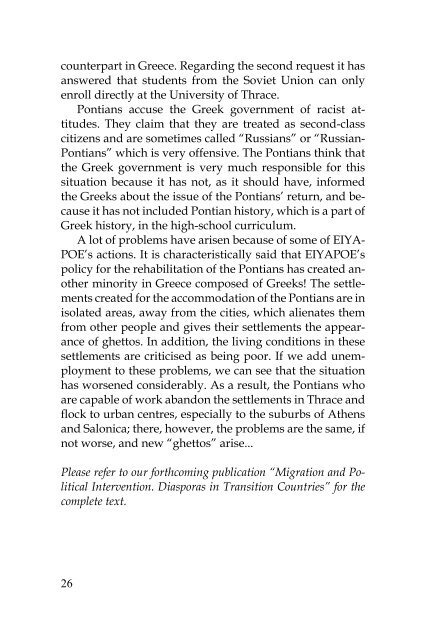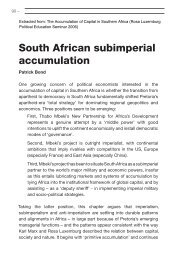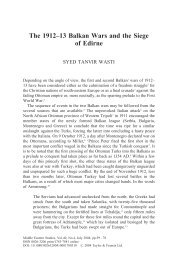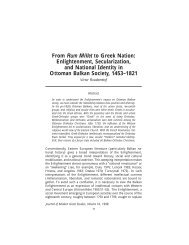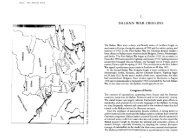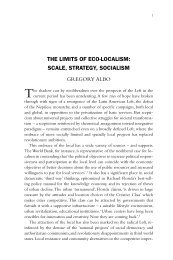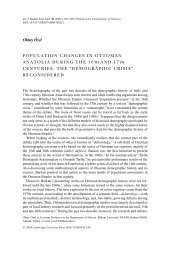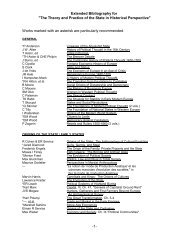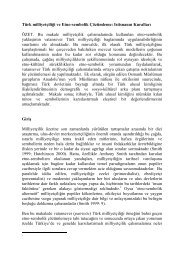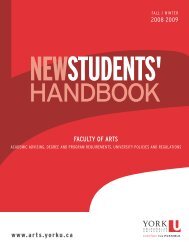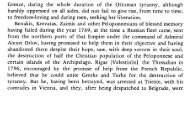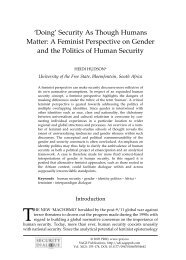The Greek diaspora in Eastern Europe and the Former Soviet Union
The Greek diaspora in Eastern Europe and the Former Soviet Union
The Greek diaspora in Eastern Europe and the Former Soviet Union
You also want an ePaper? Increase the reach of your titles
YUMPU automatically turns print PDFs into web optimized ePapers that Google loves.
counterpart <strong>in</strong> Greece. Regard<strong>in</strong>g <strong>the</strong> second request it has<br />
answered that students from <strong>the</strong> <strong>Soviet</strong> <strong>Union</strong> can only<br />
enroll directly at <strong>the</strong> University of Thrace.<br />
Pontians accuse <strong>the</strong> <strong>Greek</strong> government of racist attitudes.<br />
<strong>The</strong>y claim that <strong>the</strong>y are treated as second-class<br />
citizens <strong>and</strong> are sometimes called “Russians” or “Russian-<br />
Pontians” which is very offensive. <strong>The</strong> Pontians th<strong>in</strong>k that<br />
<strong>the</strong> <strong>Greek</strong> government is very much responsible for this<br />
situation because it has not, as it should have, <strong>in</strong>formed<br />
<strong>the</strong> <strong>Greek</strong>s about <strong>the</strong> issue of <strong>the</strong> Pontians’ return, <strong>and</strong> because<br />
it has not <strong>in</strong>cluded Pontian history, which is a part of<br />
<strong>Greek</strong> history, <strong>in</strong> <strong>the</strong> high-school curriculum.<br />
A lot of problems have arisen because of some of EIYA-<br />
POE’s actions. It is characteristically said that EIYAPOE’s<br />
policy for <strong>the</strong> rehabilitation of <strong>the</strong> Pontians has created ano<strong>the</strong>r<br />
m<strong>in</strong>ority <strong>in</strong> Greece composed of <strong>Greek</strong>s! <strong>The</strong> settlements<br />
created for <strong>the</strong> accommodation of <strong>the</strong> Pontians are <strong>in</strong><br />
isolated areas, away from <strong>the</strong> cities, which alienates <strong>the</strong>m<br />
from o<strong>the</strong>r people <strong>and</strong> gives <strong>the</strong>ir settlements <strong>the</strong> appearance<br />
of ghettos. In addition, <strong>the</strong> liv<strong>in</strong>g conditions <strong>in</strong> <strong>the</strong>se<br />
settlements are criticised as be<strong>in</strong>g poor. If we add unemployment<br />
to <strong>the</strong>se problems, we can see that <strong>the</strong> situation<br />
has worsened considerably. As a result, <strong>the</strong> Pontians who<br />
are capable of work ab<strong>and</strong>on <strong>the</strong> settlements <strong>in</strong> Thrace <strong>and</strong><br />
flock to urban centres, especially to <strong>the</strong> suburbs of A<strong>the</strong>ns<br />
<strong>and</strong> Salonica; <strong>the</strong>re, however, <strong>the</strong> problems are <strong>the</strong> same, if<br />
not worse, <strong>and</strong> new “ghettos” arise...<br />
Please refer to our forthcom<strong>in</strong>g publication “Migration <strong>and</strong> Political<br />
Intervention. Diasporas <strong>in</strong> Transition Countries” for <strong>the</strong><br />
complete text.<br />
Exist<strong>in</strong>g surveys on <strong>the</strong> Pontian <strong>Greek</strong>s<br />
Several surveys have been conducted on <strong>the</strong> Pontians;<br />
<strong>the</strong> most reliable survey has been conducted by K. Kasimati<br />
(1993b). I <strong>in</strong>tend to present some elements which are<br />
very <strong>in</strong>dicative of <strong>the</strong> liv<strong>in</strong>g conditions of <strong>the</strong> Pontians <strong>in</strong><br />
Greece. However, we should bear <strong>in</strong> m<strong>in</strong>d that this survey<br />
was conducted <strong>in</strong> 1990 which means that <strong>the</strong> majority of<br />
<strong>the</strong> Pontians had arrived fairly recently; a fact that has certa<strong>in</strong>ly<br />
affected <strong>the</strong> results of <strong>the</strong> survey.<br />
We should beg<strong>in</strong> with some f<strong>in</strong>d<strong>in</strong>gs on <strong>the</strong> household<br />
structure, that is, <strong>the</strong> family as an economic unit. <strong>The</strong> average<br />
Pontian household is composed of 4.5 members, while<br />
<strong>the</strong> average <strong>Greek</strong> household has 3.49. This is usually <strong>in</strong>terpreted<br />
<strong>in</strong> <strong>the</strong> follow<strong>in</strong>g way: because <strong>the</strong> Pontians are economically<br />
weaker than <strong>the</strong> ‘<strong>Greek</strong>s’, <strong>the</strong>y ga<strong>the</strong>r <strong>in</strong>to larger<br />
households <strong>in</strong> order to lower <strong>the</strong> liv<strong>in</strong>g costs per person.<br />
Fur<strong>the</strong>rmore, <strong>the</strong> Pontians <strong>in</strong> Greece consist of 51 percent<br />
women <strong>and</strong> 49 percent men; <strong>the</strong>ir division accord<strong>in</strong>g to age<br />
is shown <strong>in</strong> table 3. Table 3 presents <strong>the</strong> follow<strong>in</strong>g data:<br />
36 percent of <strong>the</strong> Pontians are between 0–19 years old, 54<br />
percent are between 20–59, which is <strong>the</strong> “productive age”,<br />
<strong>and</strong> 8.7 percent are over 60 years old. Most of <strong>the</strong>m, as we<br />
know, reside <strong>in</strong> A<strong>the</strong>ns (60 percent) <strong>and</strong> Salonica (15 percent).<br />
Age groups<br />
Percentage<br />
0–19 36.8 %<br />
20–49 46.6 %<br />
over 50 16.6 %<br />
Total 100.0 %<br />
Table 3: Pontian <strong>Greek</strong>s accord<strong>in</strong>g to age before<br />
leav<strong>in</strong>g <strong>the</strong> former <strong>Soviet</strong> <strong>Union</strong><br />
Source: Kasimati, 1993b<br />
26 27


